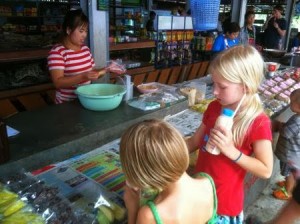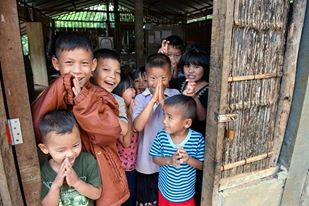Risk and 3rd World Business Development
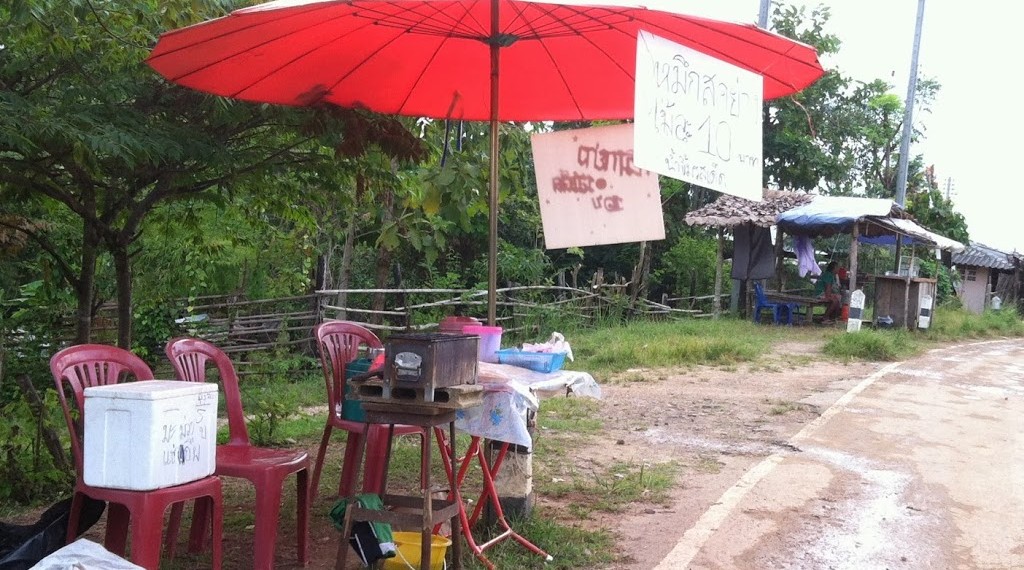
In a TEDtalk titled, Let’s Raise Kids to be Entrepreneurs, Cameron Herold, founder of 1-800-Got-Junk, one of the largest junk removal companies in North America, defines an entrepreneur as “a person who organizes, operates and assumes the risk of a business venture.”
The villages and cities in Thailand are full of people who organize and operate business ventures, and they also assume small amounts of risk. Anywhere there are people to buy there are also people there to sell. Roadside stalls hawking everything from local produce, to tofu, hot dogs, and pork balls on a stick heated in a vat of oil or grilled over charcoal.
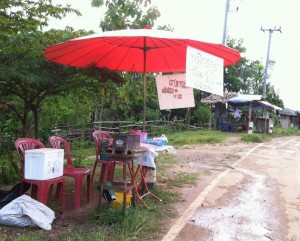 |
| Squid on a stick for sale |
Many homeowners convert the front room of their houses into tiny neighborhood shops where they supply the kind of items people run out of at the last minute when cooking the evening meal, like rice and oil and seasonings, as well as little candies and sugar drinks that the neighborhood kids flock to buy when they have a coin or two.
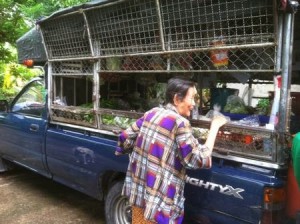 |
| This neighborhood store is in a truck. |
They work hard and they take initiative in order to survive. What is largely absent from this equation is innovation.
Every roadside stand, for miles, sells the exact same fruit.
Every front room store has similar content.
Everyone wants to start a store, or roadside stand, because that’s an accepted way to make money.
But few are willing to try something new and do something that hasn’t been done before.
To do something differently than it has been done before one must take risks, and leaps of faith, and try, and fail, and learn, and try again until you succeed.
One must learn not to fear the risk taking.
Try teaching that to a hill tribe community on the unforgiving precipice of poverty, or parents in a refugee camp reusing other people’s trash just to survive.
Talk about incentive to be risk averse.
But it is calculated risk taking, and investing in new ideas that often yields the most rewards.
This is something we are teaching the people here how to do, and this is something we ourselves are doing as an organization.
We are innovating childcare here. We are working toward a method of full sustainability that teaches the fundamentals of innovative entrepreneurism and supports healthy strong communities. We are in the position of those we want to serve. We have to assume risk and try as many different ways to do it as possible in order to learn the best ways and be able to teach them to others. We must take on the risks of experimentation ourselves initially in order to both, minimize it somewhat for the people we are training, as well as to inspire them to go out and try new ideas themselves.
This process of learning takes time, and progress is not always easy to measure.
After all, taking an idea and transforming it into a real world method requires a lot of experimentation and tinkering.
So we are learning to add another measure of success, as a startup working on startups probably should. We’re looking at it from the perspective of, how many things have we tried?
How many businesses have we started?*
How much raw data do we now have that we can access to see what works?
One of our board members likes to provide what is known as venture capital to tech start up companies. He loves to be part of seeing a new idea taken to the next level. He’ll invest a lot of money in several different companies at a time, because it only takes one good idea to get off the ground and the return on his investment is huge.
You all are venture capitalists. You are investing in getting a good idea, even a world changing idea, off of the ground. This is really rare in the non-profit sector, to have people willing to invest in something new, something innovative. It should be more common but it’s not.
So applaud yourselves as the visionaries that you are.
You have made it possible for us to learn, and experiment, and find the best way to make this happen for the people here in Thailand, and to encourage them to do the same for themselves.
*Transport business
Brooms
Coffee, tea, and avocado seedlings
Marketing a fuel additive
Small scale pig farming
Carrien is co-founder of The Charis Project, Family Education Curriculum Developer, and mom of 6.
You can get her free mini-course on Making Your Family More Resilient here.

